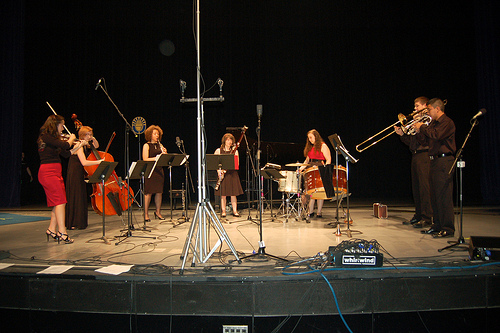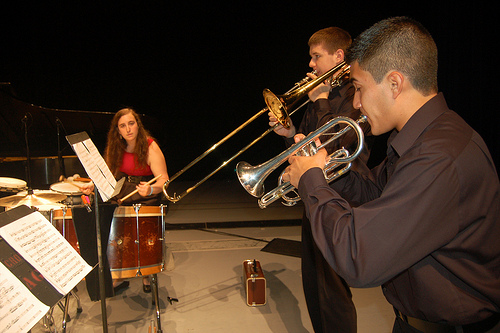Show 238: Listening Guide
From the Top’s Show 238 was taped in the Aire Crown Theater at the McCormick Place in Chicago, Illinois on Saturday, July 2, 2011. We asked our performers to tell us about the music they performed on the show:
Stephanie Block, 17, viola
I. Andante comodo from Concerto for Viola and Orchestra
By: William Walton
Walton’s viola concerto holds a special place in my heart. It has been with me for the past year, and is definitely my favorite viola concerto. I love the “British-y” aspect of it- to me, British music has a certain unique quality. It’s not too melodramatic or too emotionless. It seems to have certain parts that are somewhat dramatic, but are masked by tranquility. Walton does a wonderful job of “sneaking” these emotions into the concerto. I like that you have to really look for the feeling in it and identify it.
My favorite part of this concerto is the beginning, with its calm and leisurely pace and its gradual  move into the exciting and intense parts. Perhaps the hardest battle I have had with this piece is all of the chords! There is one part in the middle with a series of sixths, and those are so hard to bring out, not to mention play perfectly in tune. That will be a continuing project for me. This piece makes me think of a distinctive love story- one that is kept under wraps until one’s feelings are finally revealed. With the beginning of the piece, you wouldn’t guess that there is any love there, but it presents itself later. Accessing my own emotions is what really helps me bring across my feeling in this piece. Compared to other pieces I have performed, the Walton continues to be one of a kind. Many people love it for both its romantic and composed aspects. It’s more emotionally mature than many other pieces I have played on viola, and for someone as emotional as me, a piece like this is best.
move into the exciting and intense parts. Perhaps the hardest battle I have had with this piece is all of the chords! There is one part in the middle with a series of sixths, and those are so hard to bring out, not to mention play perfectly in tune. That will be a continuing project for me. This piece makes me think of a distinctive love story- one that is kept under wraps until one’s feelings are finally revealed. With the beginning of the piece, you wouldn’t guess that there is any love there, but it presents itself later. Accessing my own emotions is what really helps me bring across my feeling in this piece. Compared to other pieces I have performed, the Walton continues to be one of a kind. Many people love it for both its romantic and composed aspects. It’s more emotionally mature than many other pieces I have played on viola, and for someone as emotional as me, a piece like this is best.
Post Show Reflection: I loved getting to know everyone, both the kids and the staff. I never knew everyone could be so relaxed and nice! Also, playing on a great stage for a huge audience was amazing. I loved the feeling after I finished, sprinting upstairs with my medal. The actual performance was so exciting. It actually wasn’t that scary, more like encouraging. Nothing compares to the feeling of performing for me. It was truly amazing.
Music has the power to heal: broken hearts, so many things. The possibilities are endless.
Geoffrey Hahn, 18, baritone
“Whither Must I Wander?” from Songs of Travel
By: Ralph Vaughan Williams
This particular piece of music transports me into the English countryside. We experience the beauty of the landscape throughout the various seasons of the year, as seen through the eyes of a wanderer. The tune is beautiful and melodic. It is written as a strophic piece, which serves to emphasize the magnitude and power of lyrics. Although there are some lighter verses, there is feeling of sadness and nostalgia in many of the images of nature, especially those that describe the rain. The lyrics are a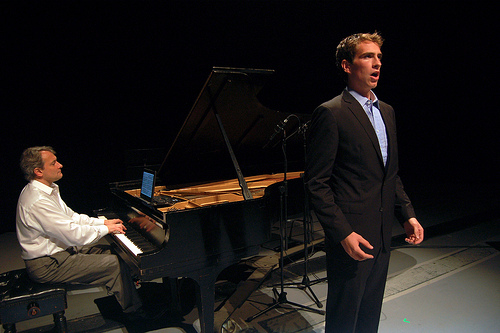 story, actually a poem, as “ Whither Must I Wander” is a part of the Songs of Travel, a group of poems written by Robert Louis Stevenson that describe the memories and observations of a solitary vagabond.
story, actually a poem, as “ Whither Must I Wander” is a part of the Songs of Travel, a group of poems written by Robert Louis Stevenson that describe the memories and observations of a solitary vagabond.
I chose this song to sing for my grandmother when she was in a coma following a serious stroke. She was a true inspiration to me; a lover of nature, an avid hiker, world traveler and music lover. Her fondest memories, which she shared with all of her grandchildren, were of her extensive travels both near and far. In her letters, she describes the magnificence of nature. Waves breaking over her on the stern of an ocean liner while she traveled through the Panama Canal, and a glorious sunrise she witnessed somewhere in the wilderness. As I finished singing to her, she opened her eyes for the first time in over a week. She died soon after, at the age of 104. I sang again at her memorial service. These memories will always be with me.
Post Show Reflection: My favorite memory from the last 2 days was the performance, especially the recording rehearsal. Being able to work with Christopher Riley is an experience I’ll never forget. The experience was fantastic! It was oddly comforting being in front of 4000 seats. The audience was warm and loving.
Music has the power to change everything from communities to countries, the power to reform!
Nikita Annenkov, 19, cello,
Impromptu
By: Alexander Arutiunian
This piece, with its Central Asia motives and musical elements, reminds me of a celebration like a 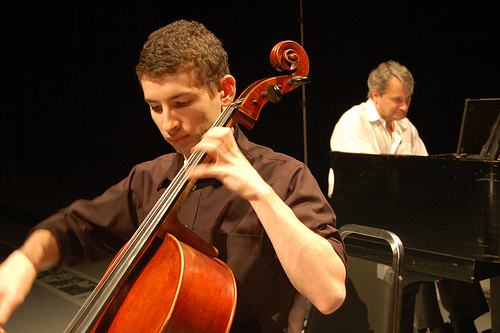 wedding in Uzbekistan. Even though it’s written by an Armenian composer, the music of both countries is somewhat alike. The A section makes me think of people dancing, playing folk instruments, celebrating. The slow part or B section brings a picture of a desert, with a clear night sky, camels resting, dunes and sand. It sounds like it could almost be a soundtrack for “Aladdin”.
wedding in Uzbekistan. Even though it’s written by an Armenian composer, the music of both countries is somewhat alike. The A section makes me think of people dancing, playing folk instruments, celebrating. The slow part or B section brings a picture of a desert, with a clear night sky, camels resting, dunes and sand. It sounds like it could almost be a soundtrack for “Aladdin”.
This piece has many colors. I think the difficult part is to show these colors, to get across the unique folk elements of the piece.
Post Show Reflection: My favorite moment of the show was after we bowed at the end of the show, went to meet the audience, and how people were expressing their appreciation for our concert and classical music in general.
I believe that music has the power to end wars, poverty, and all the negative things in this world.
Septacular (Timothy Riordan, Artistic Director; Bryan Polacek, coach)
Merit School of Music
I. Soldier’s March, III. Royal March, V. The Devil’s Dance from The Soldier’s Tale
By: Igor Stravinsky
Julia Ghica, 17, violin
I love the different moods that are incorporated in this piece. For instance, we once had to gallop around the room to feel the aesthetic of a phrase then I had to serenade a vacuum to get the mood of a different section. I also love the instrumentation since violinist usually play with strings players or pianist, it’s awesome to be able to play in a small ensemble with other instruments.
This is the first time I’ve worked in an ensemble where we all were at an extremely high level of playing and where we all became so familiar and comfortable with a piece of music. I’m so privileged to have played L’Historie with people who really decided to commit.
Post Show Reflection: My favorite memories were the recording day, taking pics/frolicking, the last performance with Septacular, and the dance. The performance was exhilarating and comfortable, because I was with 6 other musicians I knew and trusted.
Music can change lives. There’s no other way I can say it.
Kamila Hines-Muhammad, 17, clarinet
The Soldier’s Tale is quite atypical instrumental chamber music; it incorporates several metric changes, abstract musical ideas and a jarring storyline of a soldier’s encounter with the devil. Parts of this piece are very intense and others are more relaxed and carefree, and my group tried to evoke these images of such dynamic shifts with our music One image my chamber ensemble and I tried to convey in the piece was the devil dancing around, perhaps in a circle around someone, very mischievously during the “Devil’s Dance.”
The Soldier’s Tale takes more focus, concentration and gravitas than any other piece I have played . One of the most imperative things to interpret was the intent behind each and every phrase Stravinsky wrote. Matching these intentions across the group was one of the biggest challenges of the piece, but also became one of the most fun.
. One of the most imperative things to interpret was the intent behind each and every phrase Stravinsky wrote. Matching these intentions across the group was one of the biggest challenges of the piece, but also became one of the most fun.
Post Show Reflection: My favorite memories post-show were watching Youtube videos backstage before going on air, the rushing sense of accomplishment post performance, and Nikita’s prom story! =) The actual performance was simultaneously terrifying, with the pressure to be perfect, and exhilarating, because it was so much fun to play in my group
Music has the power to change the world and unite everyone to a common cause and emotional connection.
Abigail Arnold, 17, bassoon
L’Histoire du soldat has so many different emotions to offer. In the first movement we go from casual to excited (almost to the point of obnoxious) and then end with the line returning to that very casual feel. Then with the royal march we have the pompous, anxious, egoistical feel. My favorite though is the maniacal “Devil’s dance.” It has everything! The devil’s excited, tries to play it cool, seduces and returns to his excitement, although it’s much more frustrated.
What amazes me more than anything else in this piece are these subtle, incredibly beautiful lines Stravinsky has written in below the melody. For instance, in “March du Soldat” the clarinet, bassoon, bass and violin have this 4 part harmony that’s intensely beautiful. I love that even though I’ve been working on it for a year now. I still find these lines that change my understanding (if the piece completely).
Post Show Reflection: I loved frolicking in the grass outside the convention center with the septet! Stephanie! Surprisingly, I wasn’t nervous when it came to the actual performance. I was just up there having fun and making music with some of my favorite people in the world!
Look around! Music is everywhere! It has the power to make life wonderful!! It’s completely awesome!!
Joel Cantoran, 17, trumpet
Post Show Reflection: My favorite memory was the live performance for 2500+ people. It was intense but very fun as well.
Music has the power to change one’s life completely!
When I play this piece, I picture the solider marching home, happily and proudly. My favorite part of the piece is my solo in the “Royal March.” This is my favorite part because it’s very “trombone-esque”. It’s loud, raucous, and rambunctious. One image that the “Devil’s Dance” invokes is the devil scampering uncontrollably around the solider.
This piece is unique because it has narration and dancers, but only with seven instrumentalists. Most pieces that have narration and choreography require a large ensemble. The most important things to go for are the style and the musical ideas. This piece is one of the hardest. I’ve ever performed in a group.
Post Show Reflection: My favorite memory was dancing after the show! There was awesome music and a dance floor. It was so fun dancing with the other performers and random people. The actual show was awesome! That theater is huge! Even though there were so many people in the audience, it wasn’t intimidating because I could barely see them because of the lights in my eyes.
Music has the power to change lives. Anybody who puts time and passion into music has the ability to do anything they want.
Daniela Gazibara, 18, double bass
I think The Soldier’s Tale is a wonderful piece. Since acting is a part of the piece we already get some direction of what our playing is supposed to portray. With that being said we still get to find our own “voice”. That’s the best part of the piece: the fact that we get to tell a story with our instruments.
The hardest thing to nail in The Soldier’s Tale is the rapid change of mood, or the feel. I’ll get maybe an eighth note of time to completely change my feel and body language. It’s difficult to communicate with the group, change the image in my head & change may facial expression while not getting lost.
Post Show Reflection: I really loved the dressing room at McCormick place. This is where we all hung out together and watched funny YouTube videos. It was an ideal bonding situation. Also, the dance party after the performance was incredibly fun! We all had a really great and memorable time! The stage was extremely dry- I couldn’t near the other members of Septacular. That made performing difficult. It didn’t help when the breeze snatched up my music. With all the said it was incredible! It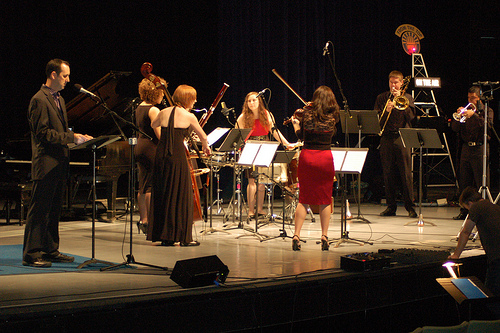 was very exciting.
was very exciting.
Music can change the world (culture, traditions, etc). It inspires a new type of thinking and allows people to communicate effectively.
Yael Litwin, 18, percussion
I love how many layers there are to this piece. As soon as you think you think you’ve got it figured out, you find some new thing that you didn’t notice before. I’m always finding new things about this piece every time I listen to it. That’s why my favorite parts of the piece are just a few measures at a time.
I love playing this piece. Because we’ve been playing it for so long, we’ve all gotten really comfortable with it and we can work on musical things during rehearsal and work on tuning the notes and getting the parts together.
Post Show Reflection: Aside from the actual performance, the dance after the show was really fun. Just to see everybody let loose and enjoy themselves was great. It was one of the most enjoyable performance experiences I’ve ever had, to be playing great music with great friends along with other great performers was just an awesome experience.
I really do believe that music has the power to change the world for the better. Music has the power to connect people from all over the world, from different to connect people from all over the world, from different countries, background, nationalities, etc.; it is a common passion for every person.
Kate Liu, 17, piano,
II. Presto from Sonata No. 2
By: Avner Dorman
I think this is one of the most exciting and fastest pieces I’ve ever played. There are lots of running notes and places with odd accents that all in all, make this piece really fun to play. My favorite part 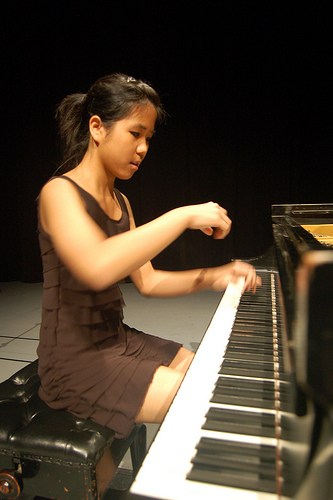 has to be when the left hand ostinato comes in towards the end, and I can’t say I have a “least favorite” part. Ironically, the way I was able to finally play this piece was when I started to “give up” on it. The technical aspect was so challenging that I sort of gave up on it and went for the excitement factor instead.
has to be when the left hand ostinato comes in towards the end, and I can’t say I have a “least favorite” part. Ironically, the way I was able to finally play this piece was when I started to “give up” on it. The technical aspect was so challenging that I sort of gave up on it and went for the excitement factor instead.
This piece is kind of jazzy, which is new to me since I haven’t played any jazz before this. I think this piece is really about the excitement, so no need to get so caught up on the technical aspects. When I play this piece, I always have an adrenaline rush that just increases as the piece goes on.
Post Show Reflection: My favorite memory was the performance at the Arie Crown Theater. I started out really nervous, but as time went on I started relaxing. Plus I couldn’t see the audience because the lights outside the stage were all off.
Music can bring joy and passion to everyone. Not only that, people will also be able to understand the universal language that has expressed emotions since the beginning of the cavemen.

